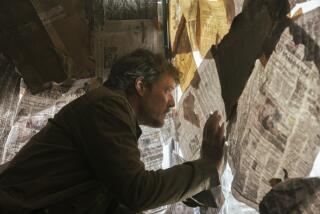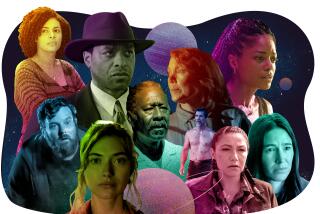‘Newton’s Apple’: Science That Hits You in the Head
- Share via
What does it feel like to step into quicksand? If you drop a piece of bread and jelly, why does it invariably land jelly side down? Why is the sky blue? Why do houses creak?
“Newton’s Apple,” the slick, magazine-format, family science show that begins its new season Jan. 28 on KCET Channel 28, answers the questions we all ponder every now and then but may be shy about asking, particularly if we’re adults. In the process, it offers basic lessons in science and technology.
“It’s an easy-to-understand, user-friendly presentation,” David Heil, the show’s host, said during a recent stop in Los Angeles. “We have a whole range of viewers from 5 to 95. They’re learning science, not just in a laboratory situation, but as part of the world around them.”
So, on any given show, Heil might be up to his armpits in quicksand (yes, you can float in it), or take his first free-fall sky dive (“there’s a lot of technology” in the equipment) or be surrounded by bees (they don’t like breath or dark colors).
Field reporter Peggy Knapp, a free spirit with an untamed mop of hair and a background in live theater, might grit through a roller-coaster ride (it uses kinetic energy) or stand on a scale in a fast elevator (your weight changes). Naturalist Nancy Gibson supplies in-studio animal guests.
Heil, associate director of the Oregon Museum of Science and Industry in Portland, is bearded, fit and, at 34, brimming with youthful enthusiasm. Calling his job “a true indulgence,” he sees his role as the eternal student.
“I’m right there in the studio, on behalf of the audience asking the same questions that they would have, demonstrating the same curiosity, the same puzzlement.
“There’s no point where you know it all,” said Heil, who has been a teacher. “The best teachers are those who continue to learn, admire and appreciate” and who “impart a sense of ‘let’s explore this together.’ ”
The show is perceived as children’s programming, but Heil reports that 80% of the “Newton’s Apple” audience is older than 18. He believes that’s because adults no longer have easy access to learning science.
“Our level is junior high, and that’s where a lot of adults got off the science education train,” Heil said.
According to series producer Richard Hudson, “Newton’s Apple” information packets, prepared with teacher input, are distributed to 40,000 teachers nationwide. Teachers are also permitted to tape segments for use in the classroom.
“We think that accessibility for junior high and up makes a frontal attack on science illiteracy,” Hudson said. “We deal in basic science, not the hottest new thing or gadget. There’s a lot to be covered in just how the world works.”
Those involved in the show make a point of crediting Dupont Corp. with unusual staying power in its support of the show since it began in 1981. Dupont also makes the school instruction materials possible.
“Newton’s Apple” has evolved since its inception as a local program on Minneapolis public television.
“The skeleton of the old format is there,” Hudson said. “But we have more personalities in the show, we dramatize the answers to questions more than before and we have shorter segments. We think that conveys the discovery of science more effectively.”
James Steinbach, the show’s executive producer and creator, said, “From the beginning, we wanted it to be fun, the way a terrific teacher makes theater out of learning, presenting the life of it, not just the facts.”
The original host, Ira Flatow, left after six years and was replaced last year by Heil, who demonstrated, Steinbach said, “a real appreciation and joy in discovery.”
Heil hopes viewers will learn that while science may be complex, it doesn’t have to be intimidating.
“The show allows people to realize their desire to know, to seek out answers they may feel embarrassed to ask,” Heil said.
“The biggest thing to learn is self-confidence as a learner. It would be wonderful if (schools) could measure how many students ask the best questions. Those students would make excellent scientists and, I’d venture to say, excellent citizens.”
“We want to challenge the kids and reward the adults,” Steinbach said. “In everything we do, we’re trying for an ‘a-ha’ quotient. As in, ‘A-ha, I didn’t know that.’ ”
More to Read
The complete guide to home viewing
Get Screen Gab for everything about the TV shows and streaming movies everyone’s talking about.
You may occasionally receive promotional content from the Los Angeles Times.





